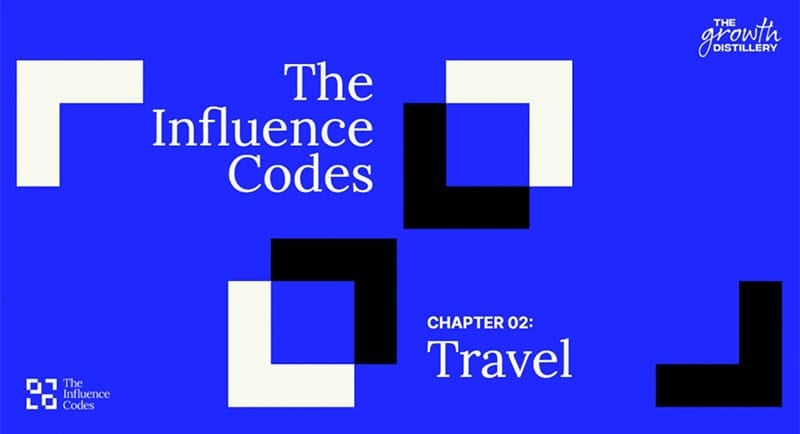By James Taylor, head of research – The Growth Distillery, and Liza Williams, head of growth intelligence – The Growth Distillery.
For over six months, The Growth Distillery, Ogilvy and Kantar have been working hard to understand how influence, that most powerful but least understood social force, works in modern society. Titled, The Influence Codes, we’ve managed to uncover wide-ranging and very applicable insights for marketing and communications, but now we’ve turned our attention to figuring out how it works in the nation’s favourite pastime and right of passage… the world (literally!) of travel.
We live in an era where traditional notions of influence are rapidly changing. Historically, travel marketing relied heavily on top-down authority. Travel agents, guidebooks, and authoritative TV shows were the trusted sources that shaped our holiday decisions. However, in today’s information-saturated world, this model is no longer effective.
According to our Influence Codes Travel report, travel for Australians in 2024 is less about getting away from life, but getting more from life, in fact we found that 7 in 10 are seeking experiences that give them more of ‘what they love’ when they travel. To help travellers achieve this we’ve identified two fundamental drivers of influence: affinity and authenticity… but what are we actually talking about here?
Authenticity, in this context, means providing genuine, relatable experiences that resonate with a traveller’s personal values and interests. Meanwhile, affinity refers to the emotional connection and trust that travellers feel towards a brand or influencer. This shift in mindset is profound and signals a significant opportunity for travel brands to stand out.
That said, consumer perceptions of the way travel brands market leaves much to be desired. A striking 39% of consumers find travel brands too generic, highlighting the need for more personalised and tailored options. Additionally, 45% of travellers feel overwhelmed by the sheer volume of choices available, underscoring the necessity for clear, trustworthy guidance.
To illustrate these insights, let’s consider the journey of two fictional travellers, Emily and Jack.

Emily’s Quest for Authenticity
Emily is a young professional who has always dreamed of exploring Japan. In the past, she might have turned to traditional guidebooks or travel agents for advice. Today, Emily’s approach is different. She follows a travel influencer on Instagram who shares her passion for Japanese culture and cuisine. This influencer posts authentic experiences, from hidden ramen shops in Tokyo to serene tea ceremonies in Kyoto.
For Emily, these posts resonate deeply because they align with her interests and provide a sense of authenticity that generic travel ads cannot match. When it comes time to book her trip, Emily is more likely to trust recommendations from this influencer, who embodies the authenticity and affinity that our research highlights as key drivers of influence.
Jack’s Need for Tailored Guidance
Jack, on the other hand, is a family man planning a holiday for his wife and two children. Faced with the overwhelming number of destinations and activities available, Jack feels stressed about making the right choices. He wants a holiday that caters to his family’s varied interests, from his wife’s love of wine tasting to his children’s enthusiasm for adventure sports.
Travel brands that understand this dynamic can offer personalised itineraries and clear, reliable guidance to help Jack make informed decisions. For instance, a travel agency could provide an online platform where Jack can input his family’s preferences and receive tailored recommendations that balance relaxation with adventure. Highlighting experiences, such as a vineyard tour with childcare services or a family-friendly adventure park, would address Jack’s need for tailored guidance and ease his decision-making process.
Picture Jack navigating a user-friendly travel site that asks, “Do your kids need to burn off energy while you sample fine wines? We’ve got the perfect itinerary for you!”
The Travel Marketer’s Playbook
The data is clear: authenticity and affinity are now the superpowers of influence in the travel sector. Marketers who understand and harness these elements can significantly enhance their impact. As I see it, our role as marketers is evolving from simply helping people get away from life to helping them get more from life.
This means moving away from generic marketing messages and instead focusing on creating authentic connections with our audiences. One of the most compelling insights from our report is the importance of personalised travel experiences.
As Liza Williams, our Head of Growth Intelligence at The Growth Distillery, aptly puts it: “our research underscores the transformative power of personalised travel experiences. By fostering authentic connections, brands can significantly enhance their influence and drive meaningful engagement with their customers.”
In the post-pandemic world, where cost-of-living pressures are mounting, the importance of authenticity and reliability has never been greater. Consumers are not just looking for destinations; they seek experiences that align with their values and aspirations.
Travel marketers who can effectively communicate these experiences will not only capture attention but also build lasting trust and loyalty.
The path to influencing today’s travellers is clear. Embrace authenticity, build affinity, and provide the personalised experiences that modern consumers crave. The Growth Distillery’s latest insights offer a playbook for navigating this new landscape, ensuring that travel brands remain relevant and resonant in an increasingly competitive market.
To delve deeper into these findings and understand how you can apply them to your marketing strategies, download The Influence Codes: Travel from The Growth Distillery website.
See also: Growth Distillery: Travel marketing ‘evolving’ as Aussies seek more personalised experiences
–
Top image: James Taylor and Liza Williams
